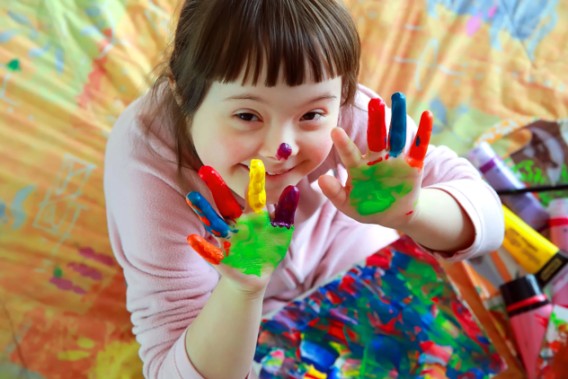People with special needs...we share their challenges and help them reach new horizons

14
03
2025
- According to the World Health Organization's definition, people with special needs are individuals with a long-term disability that impacts their interaction with their environment and limits their ability to participate fully and effectively in society on an equal basis with others. They are dependent on others to meet their needs and requirements, or they require special tools that require specialized training or rehabilitation to help them adapt to their environment.
- Disabilities specific to people with special needs:
- Motor disabilities, including:
* Cerebral palsy:
This is a deficit in the nervous system in the brain, resulting in paralysis affecting either all four limbs or only the lower limbs, or affecting one side of the body, either the right or left side. This paralysis results in a loss of control over various voluntary movements.
* Progressive muscular atrophy:
A genetic disease that begins by affecting the voluntary muscles in the patient's four limbs, then progresses to affect the rest of the involuntary muscles. * Spinal disc herniation or clefting:
Vitality in the spinal cord is severely damaged when parts of it break away, disrupting its basic functions completely or partially.
* Various congenital malformations:
These are various congenital malformations that occur for genetic or non-genetic reasons, occurring during abnormal pregnancy, and affecting the joints or bones. These malformations appear either as underdeveloped limbs or as abnormal bone curvatures.
* Other conditions with different diagnoses:
These are various conditions, including: (polio, osteoporosis, endocrine disorders, spinal cord diseases, chronic peripheral nerve diseases, and other chronic diseases affecting the blood vessels).
- - Intellectual disability (mental development):
Intellectual disability refers to the arrest or incompleteness of mental development and is attributed to mental or physical disabilities that arise before puberty. These include developmental Down syndrome, autism, and learning and reading difficulties.
A person with a learning disability experiences a persistent disruption in basic brain-centered processes that affect listening, thinking, speaking, reading, writing, spelling, and sometimes arithmetic.
Intellectual disability can be detected early and persists throughout an individual's life.
- - Behavioral/Psychological Disabilities
Includes disabilities that affect mental health such as depression, anxiety, and behavioral disorders. People with psychological disabilities require specialized psychological support to overcome the challenges they face.
This includes bipolar disorder and autism.
- Special needs related to sensory impairments
Includes blindness, visual impairment, deafness, and hearing impairment.
*Hearing
A child can develop hearing loss for several reasons, ranging from early childhood illness, difficulties during birth, and reactions to toxic medications.
Children with mild or moderate hearing loss are sometimes called hard of hearing or hard of hearing. Only those with almost complete loss are called deaf.
As with other types of disabilities, the milder the hearing loss, the more likely a child will be accepted into a regular classroom, at least for part of the day.
*Vision
Children with visual impairments have difficulty seeing even with corrective lenses.
As with hearing loss, the signs of visual impairment depend somewhat on the extent and nature of the problem.
Poor vision means that a person has vision that can be used for reading, but often requires a special optical device such as a magnifying glass to do so.
As with hearing loss, the milder the impairment, the more likely a child with a vision problem will spend some or even all of their time in a regular classroom.
- - Causes of disability:
* Genetic disorders, either due to genes inherited from one of the parents or due to external influences.
* Some diseases affecting the mother or accidents during pregnancy or childbirth.
* Complications of some diseases resulting from neglected treatment and lack of control, such as:
Muscle-related diseases and arthritis.
، Heart disease and stroke.
، Cancer.
، Diabetes.
، Nervous system diseases.
، cquired disability resulting from work-related injuries or accidents.
، Advancing age.
* Unknown causes
- - Medical services provided by the International Medical Center for people with special needs:
The International Medical Center includes an integrated unit that houses the latest medical equipment and technologies used in this field ، It also includes a group of the most qualified doctors who form an integrated team encompassing a variety of different specialties ، To provide the best care for our children with special needs, healthcare (such as medication, physical therapy, etc.) depends on the type of injury the child has. Treatment involves collaboration with several different specialties, such as:
Pediatric Clinic
، Speech Pathology Clinic
، Pediatric Neurology Clinic
، Audiology Clinic
، Child Psychiatry Clinic
، Physiotherapy and Motor Rehabilitation Clinic
، Occupational Therapy Clinic
، Enuresis Rehabilitation Clinic
، Psychoanalysis Unit
، EEG
، EMG



